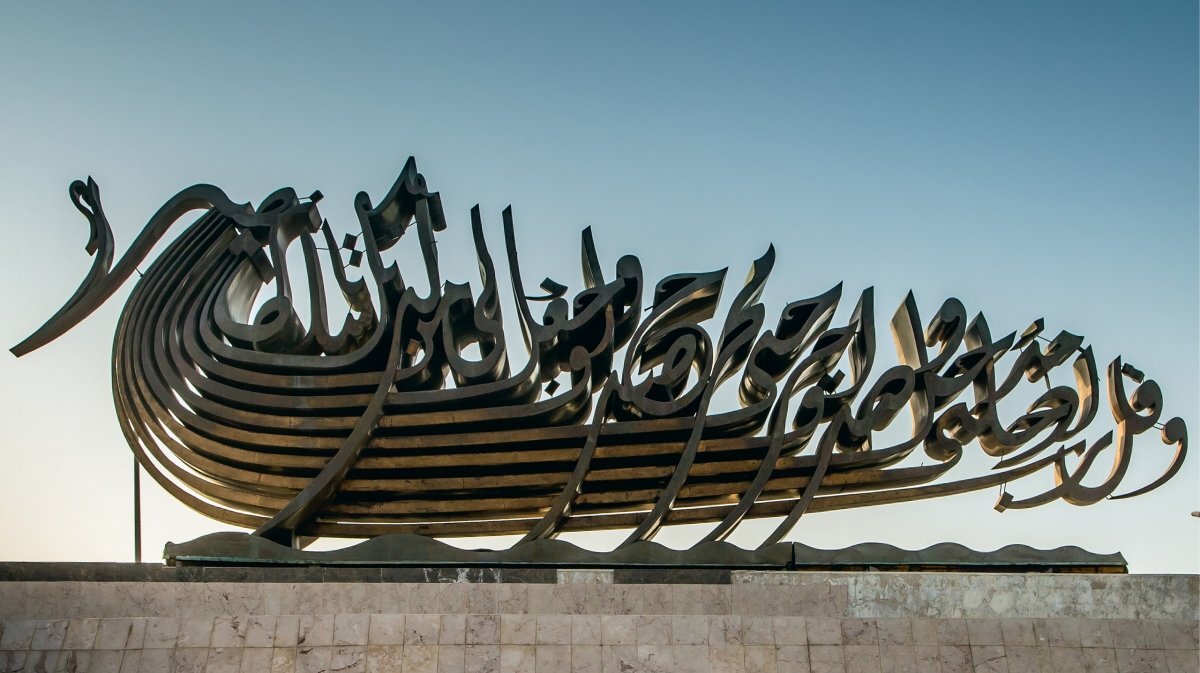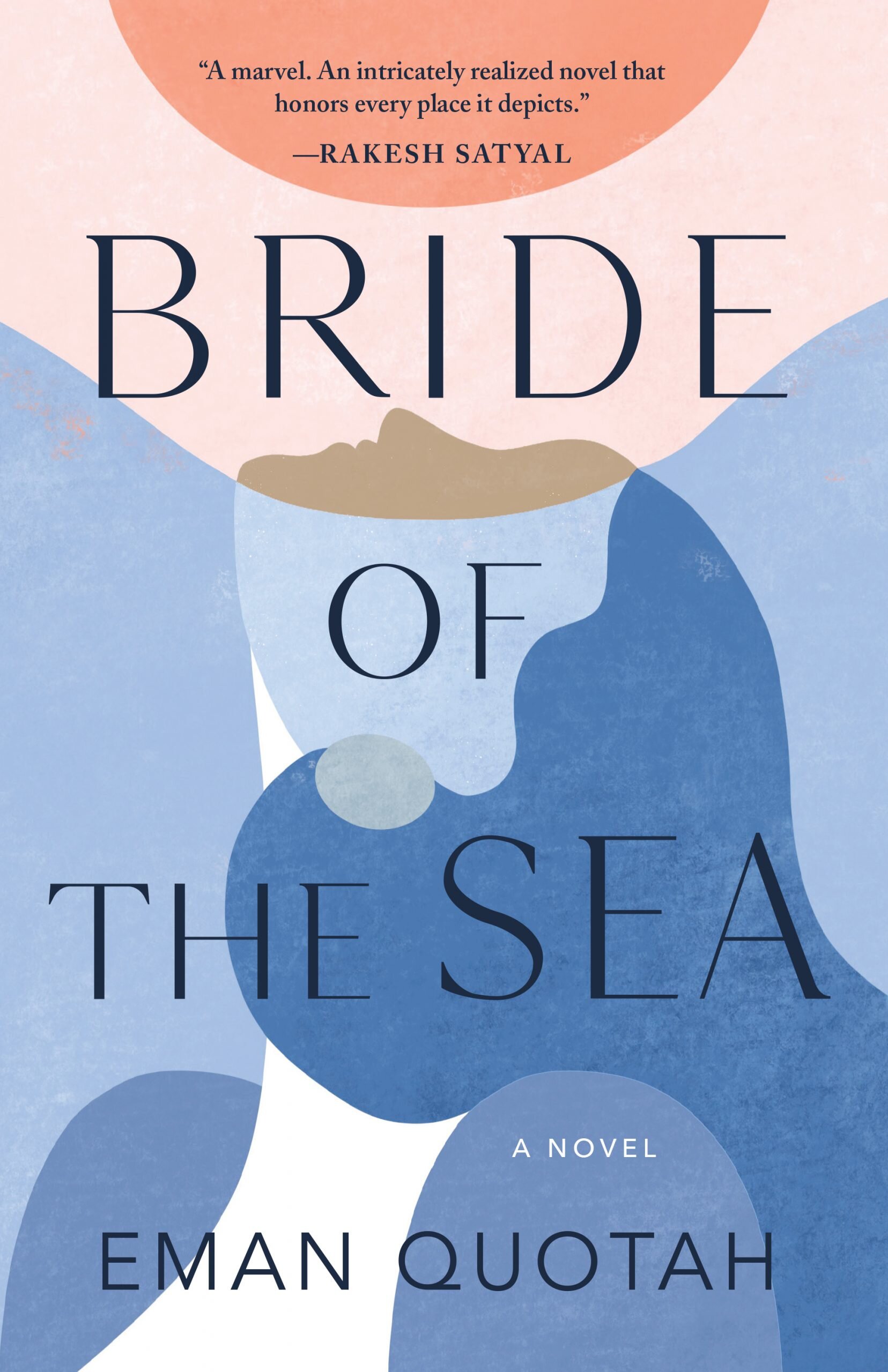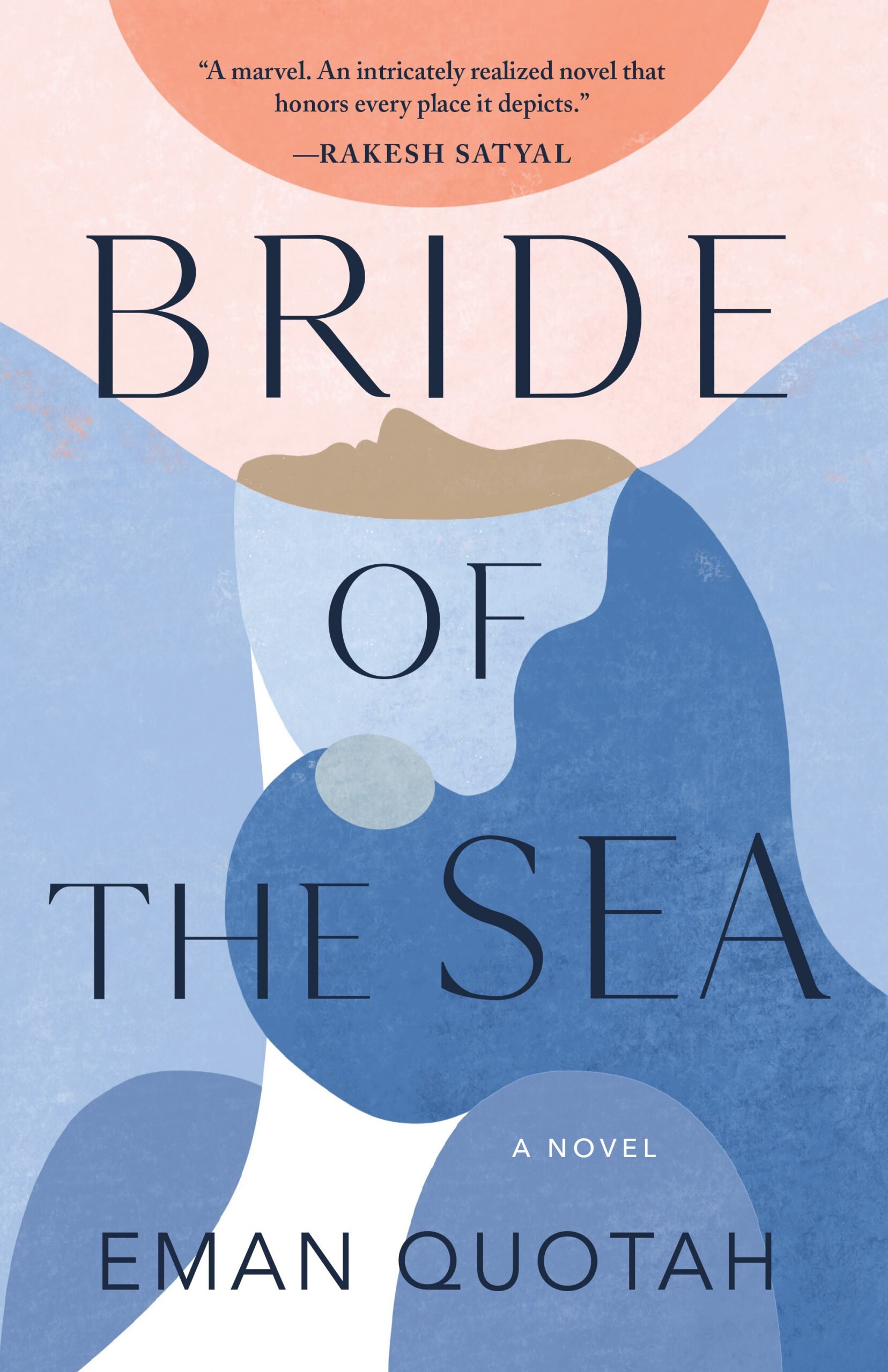 <
<
The Verse Boat by sculptor Julio Lafuente, Prince Sultan Street, Jeddah, 1981
Bride of the Sea, a novel by Eman Quotah
Tin House 2021
ISBN 9781951142452
New from Tin House in January, Bride of the Sea
During a snowy Cleveland February, newlywed university students Muneer and Saeedah are expecting their first child, and he is harboring a secret: the word divorce is whispering in his ear. Soon, their marriage will end, and Muneer will return to Saudi Arabia, while Saeedah remains in Cleveland with their daughter, Hanadi. Consumed by a growing fear of losing her daughter, Saeedah disappears with the little girl, leaving Muneer to desperately search for his daughter for years. The repercussions of the abduction ripple outward, not only changing the lives of Hanadi and her parents, but also their interwoven family and friends—those who must choose sides and hide their own deeply guarded secrets.
Eman Quotah’s Bride of the Sea proffers a story of colliding cultures, immigration, religion, and family; an intimate portrait of loss and healing; and, ultimately, a testament to the ways we find ourselves inside love, distance, and heartbreak.
You Drive Me Crazy
excerpted from Bride of the Sea
By Eman Quotah

Hannah pulls the Fine Young Cannibals cassette from the shelf and remembers she has nothing but dollars in her purse. She should go ask Muneer for riyals. Put the tape back and walk from the music shop to the Safeway, where he and Lamees are buying groceries. Or better yet, come back another day with her own money, converted into the correct currency. Either option should be easy, as sending a letter to Malik or calling her mother should be easy.
Ever since she arrived in Jidda less than a week ago, leaving Cleveland a month and a half into the fall semester at the art institute, she’s felt restless, listless, rudderless. She’s questioned whether it was a good idea. She needs to grab onto something.
It’s not that she expected to feel instantly at home. She’s moved too much with her mother to think she’d settle into a new place, like putting on a spiffy new outfit and loving how she looked in the mirror, how the clothes made her feel. No, she’d known she would need time to acclimate to this place her parents “came from.”
The cassette tape is solid in Hannah’s hand. She slips it under her abayah and into her jeans pocket. Keeping her hands hidden under the black robe—which she can’t get used to wearing, but is useful for shoplifting—she pats the little rectangle. It feels like a piece of home.
The whole tape shop feels familiar, with its smell of plastic, though the tapes are not the same as the ones in the United States; they are cheap and black-marketed, in thick, soft, unfamiliar packaging with typos on the song lists. The shop is darker and smaller than the Sam Goody in Ohio, too. Instead of carpet, her footsteps land on black and white tiles, mottled like birds’ eggs. But the place is full of music she recognizes. FYC and the Smiths and Kate Bush.
To take that familiarity out of the shop with her, she is absconding with a buck or two worth of merchandise. So what?
She feels her femaleness constantly here in Jidda, in a way she occasionally does in America. For example, though she isn’t the only woman in the shop, she’s the one woman alone. The one person alone. Two teenage girls with fuchsia lipstick and teased, frosted bangs poking out from under their black headscarves brush past her and giggle. Two young men in jeans and knockoff-looking Levi’s T-shirts hold hands in the M section. She’s curious: Are they Arab or Indian? Are they gay? Up at the cash register, a group of American soldiers in desert camouflage and brown combat boots negotiates with the shopkeeper.
One soldier has mirrored sunglasses, a crooked smile, and a black crew cut. Later, at an underground party up the coast, Erasure in the background, she’ll learn his name is Zee. Surrounded by drunk and flirty European and Arab expat high schoolers, and a few Saudis thrown in—pretending, like her, not to be Saudi—she’ll tell him, “I had a feeling I’d see you again. I had a feeling we would meet one day soon.”
He will tell her she’s making it up, and she’ll try to convince him. “No really, it was like a waking dream. I saw you in my mind without those glasses. I knew it was you. I knew I would see you again.”
She can’t see his eyes the night she steals the tape, but she can tell he’s watching her. What’s with the sunglasses? she thinks. Don’t you know it’s nighttime, buddy? As though he has heard her, he gives her a little salute. Is that kosher? Kosher isn’t the word. Is that regulation? She salutes back and regrets it. She shoves her hands beneath her abayah to keep them from stealing or saluting anymore.
The female soldier next to Zee elbows him hard, and it occurs to Hannah that they don’t know she’s American, like them. Hannah’s stomach twists. She thinks they noticed her stealing. Will they report her to the shopkeeper?
She considers returning the tape to its shelf—the right thing, the honest thing. She thinks about saying something to the soldiers in English. “Thanks for your service” or “How long you guys been here?” or “Whaddaya think of this place?”
Her father appears at the door. Three years since their reunion and he is almost as much a stranger to her as the soldiers are. She came here to get to know him better. It seemed like the fastest way.
“Lamees is in the car,” he says. “Yalla.” Probably the word slips past his lips involuntarily, without him thinking about whether she’ll understand. Yalla is one of a few words Hannah has picked up so far. Yalla: hurry up. Ahlan: welcome. Akhuya: my brother. Abuya: my father. Ummi: my mother.
She’s learned the words’ meanings, but she hasn’t spoken them.
As they walk to the car, the humid night air warms her face. Her headscarf presses against her hair and summons her sweat. She hates wearing the scarf, but she doesn’t want to break the rules. The parking lot and streets are crowded with honking cars. Why do men drive angrily here, as though cutting someone else off is the only outlet for frustration?
Hannah’s father keeps his eyes on the Americans, who have finished their negotiating and are piling into a Jeep. He seems especially to be watching Zee, who among the tall Americans is the tallest.
Or maybe it is Hannah who is especially watching Zee. She touches the stolen tape again.
“The king asked them to come, but they walk around like they own the place.”
“They’re my age,” Hannah says. She doesn’t know enough about the politics to understand any of it, or enough about her father to guess the true sentiment behind his words. Does he oppose the Americans coming here, or is he wary?
Her own reasons for being here seem trivial compared to young soldiers “fighting for freedom”—if that’s how they see themselves. If she were being honest, the reasons she has come to Jidda are, in order: to piss off her mother, to meet her siblings, to avoid a semester of art school and her job at the art supply store, to see her father.
“You don’t have to work, Hanadi,” her father said as they sat in a car outside her Cleveland Heights apartment a little over a month ago, an international airline ticket on the armrest between them. If she were a better person she would have argued with him. But she’s been low on money, and her mother found her number over the summer and started calling her several times a week to tell her to come home.
She is twenty. She can live wherever she wants. Go wherever she wants. She doesn’t have to go “home” to her mother’s lies.
Her father picked up the ticket with his index and middle fingers and held it in the space between them.
“Your brothers can’t wait to see you.”
The idea of brothers never occurred to her.
She always wanted a sister, someone to share in-jokes with, to repeat lines from movies with, to be the other person in the world who knows what it was like to be her mother’s daughter.
She ran away. She looked up W’s name in the Toledo phone book, which they had at the Cleveland library, and called four people with the same last name until she heard the familiar Polish accent.
“Of course I remember you,” W said.
So Hannah bought a Greyhound ticket to Toledo with her paycheck from the convenience store where she worked at the time. She finished high school in Toledo, living with W and W’s boyfriend, Tod.
When Hannah got into art school in Cleveland, but not in New York, Rhode Island, LA, or DC, W told her not to go back.
“Your mom will find you.”
Hannah didn’t listen. She moved back to Cleveland, into her own apartment. She gave Muneer and W her new address. But she didn’t tell her mom.
Being here, she has a weird, admittedly vindictive urge to tell her mother where she is. “Here I am, in the place you kept me from, with the father you said was dead.”
Hannah slides into the crimson-vinyl back seat of her father’s white Chevrolet sedan. It smells like some sort of woody incense. Sitting in the front, Lamees turns her veiled face toward Hannah. “Did you find what you were looking for?”
Lamees and Hannah’s father are the first people Hannah has ever met who sound like her mother. That thin membrane of accent that makes her mother a mystery is normal here, is how English comes out their mouths. This place—this bride of the Red Sea, as her father calls the city—is the origin of her mother’s phonemes. The blue sky like a vat of dye, the air like steam in a bathroom, the promise of sea to the west and carpets of sand to the east, somewhere over there past the city limits. These things gave birth to her mother’s p‘s that are not quite p‘s, her v‘s that bear passing resemblance to f‘s, her insistence on opening lights rather than turning them on.
And so there is a strange familiarity she feels with these two, while at the same time she finds it disconcerting to speak to Lamees in public, to speak to someone whose eyes and mouth she can’t see. Disconcerting to speak with her father, who was dead, who claims one day Hannah disappeared with her mother in a poof. Like I was some sort of five-year-old genie, she wrote to Malik in the letter she’s been working on since she boarded the plane in Cleveland. She’s already written five pages, front and back. Is that what happened? Whatever the truth, she blames her mother for lying about her father’s death, which suggests she lied about so much more. Sometimes Hannah blames both her parents, but mostly her mother.
“They didn’t have what I wanted,” she tells Lamees. It’s a white lie. Hannah is not an incurable liar like her mother.
The neon ads of the city are reflected in miniature in her car window: tires, soda, furniture, fresh juice. Her father stops at a shawarma shop, the spit directly outside manned by a guy with a carving knife and a chef’s hat and patches of sweat on his back and under his arms.
Alone with Lamees, Hannah starts to hum. She’s ruined things for herself; she can’t listen to the tape because she’s lied. Why did she lie?
“I stopped listening to music,” Lamees says. “I used to love it, but the Prophet told his followers only the human voice and drums are halal.”
What kind of person doesn’t like music? About her stepmother, Hannah wrote: It would be weirder if my father and I had any history together. As it is, she’s some stranger. She can’t figure out what to make of me. Maybe that’s not fair. Maybe that’s my problem. I want to get to know her. Really.




